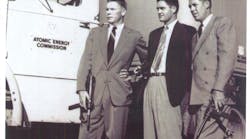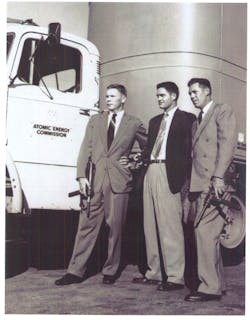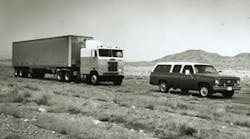The Worst Trucker in the World is back, bigger and badder than ever—because the latest recipient of the dishonor is a fleet run by the U.S. government. And, despite management issues that would warrant an FMCSA intervention, the fleet is still rolling. Indeed, business is booming, so to speak.
But what follows is what we in the journalism racket call a “buried lede,” which means—aside from the fact we can’t spell—that the most important part of the story isn’t at the top, where it should be. Instead, it’s kind of like all those chain emails I get from my retired father, with the punch line/moral lesson/epiphany at the end. But, like a good chain email, the story is actually interesting as the suspense builds—so read on. Although I suppose the archival photo below offers a hint.
But first, today’s vocabulary word: “Schadenfreude.” It’s an appropriately unattractive word for the pleasure one takes from the misfortune of others. Still, truckers should be forgiven for smirking when they learn that bureaucrats can't run a small, specialized trucking operation. Apparently, based on an extensive investigative report by the Los Angeles Times (difficult to read on their frustrating website because of the pop-up ads), a $237 million dollar annual budget isn’t enough to update the equipment of the 42-truck fleet, or prevent turnover. So far, sounds like a lot of small fleets—except for that taxpayer-funded budget part.
And instead of Compliance, Safety, Accountability program problems, the operation of the Office of Secure Transportation (OST) has a history of “irregularities in the human reliability program.” This even though OST boasts a selection process that is “rigorous” for this “vital position,” and fewer than 2% of all applicants complete their “arduous 21-week training cycle.”
Still, OST reports no fatal accidents or hazardous cargo spills in its 40-year history—but since it’s, um, kind of “secretive” and I couldn’t find their SMS data, I cannot confirm the claim. But there is the LA Times report of troubling practices and events, backed up by public records, nonetheless. Notably:
- An outdated fleet, “antiquated even by commercial standards”
- A third of the workforce's putting in more than 900 hours of overtime to make up for personnel shortages
- Cancelation of training classes because of funding shortages
- A site manager’s threatening to kill an employee in an altercation, but no disciplinary action taken; and, to top them all
- An extremely high incidence of alcohol-related events, including the OST’s top executive being arrested for drunk driving.
And talk about “organizational culture,” much of the LA Times report isn’t new. The DOE’s Office of Inspector General was called in to review allegations of boozing and misconduct in 2010, and the OIG’s findings got a lot of press. OST experienced 16 alcohol-related incidents from 2007 through 2009, from a total population of fewer than 600 of those “highly trained” couriers.
Of the "greatest concern,” according to OIG, were two incidents that occurred during secure transportation missions while the couriers were in “Rest Overnight Status,” a period during extended runs where couriers check into local area hotels. In 2007, a courier was arrested for public intoxication; in 2009, two couriers were handcuffed and temporarily detained by police officers after an incident at a local bar.
“This has a classic footprint of an antiquated and inefficient supply chain management system that was created at a time of national emergency,” Nick Vyas, an industrial logistics expert at USC, told the LA Times. “If this were a private operation, it would be out of business in less than 90 days. No person in their right mind would subscribe to a service like this.”
Ready for it? OST hauls nuclear warheads, among its lethal loads. But, if you’ll read the full story, the operation is very complicated and very serious. The agency looks for combat vets and trains couriers more intensively in weapons handling than truck handling. Terrorists are considered much more of a threat than highway accidents, and transport is set up accordingly. The LA Times report is timely because a lot of nuclear missiles are scheduled for disposal.
Otherwise, the obvious solution would be to let a properly vetted and professional for-hire carrier handle it. Takers?
Cheesy video aside, you can learn a little more about OST (and even apply for a job) here.
With apologies to Paul Harvey and “The Rest of the Story,” WTITW is a rip off of an old Keith Olbermann shtick. But rather than lampooning politicians or celebrities, I pass along trucking industry misbehavior that’s so egregious, brazen and or just plain dumb that it makes headlines in the broader media. And those sorts of reports, while often completely mischaracterizing the trucking industry and the many, many truly professional drivers, do nonetheless make everyone look bad. In short, the Worst Trucker is a person who serves to educate and inspire by counter-example.
Got a candidate? Pass along a news report.







